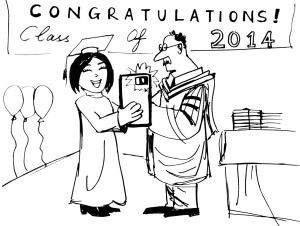‘Selfies’ should not be taken at graduation
Graduation ceremonies can be one of the most exciting and memorable parts of a young adult’s life. After completing years of schooling, surely filled with challenges and growth, an important aspect of a commencement ceremony is documenting it. However, as new students graduate in the ever-advancing technological age, standards surrounding commencement must be maintained, which includes eliminating the presence of distracting elements at the ceremony. Therefore school administrations should have the right to discourage students from taking selfies, a photograph that one has taken by oneself usually with a smartphone and uploaded to a social media account, at commencement ceremonies.
According to the Sacramento Bee, the administration at Elk Grove High School near Sacramento, California decided to withhold diplomas from two graduates who took selfies while walking across the graduation stage. The administration, who had warned students prior to the ceremony not to take selfies, characterized the students’ actions as “inappropriate behavior.” The school reasoned that selfies slowed down the progression of the already long ceremony.
And it seems like it would have. The high school has an enrollment of 1,800 students, according to the school’s website, which would mean that about 450 seniors were graduating across the stage during the ceremony. If each student took the moment to stop and take a selfie before crossing the stage it would surely slow the ceremony down.
The problem is not with documenting the ceremony and act of graduation — it’s the method by which it’s now being done. In the U.S., senior portraits and yearbooks are common memorabilia for graduates to mark the end of their schooling. Yet the growth in technology and the selfies trend has changed the way graduation day looks.
People between the ages of 18-24, or college-aged people, according to a 2013 study by StyleCaster, are the most likely to take selfies. Furthermore, each day more than 1 million selfies are taken and posted to social media accounts.
With the growth in freedom that technology and selfies bring, students might think that the school administration does not have the place to regulate whether they can take selfies or not. Yet standards need to be set on this growing trend.
Since the school institution is doling out the cash for the graduation ceremony and is in charge of planning it, school officials should have the right to set the rules. Yes, students and their families generally contribute to the funds of the school. Then again, in return for the payments, they are receiving an education and a diploma with the school’s name on it.
Yes, selfies are en vogue. But traditions have been around longer. If a school deems it necessary to maintain the sanctity of a commencement ceremony (not to mention its flow) by restricting students from taking selfies on the stage, then they should be allowed to do so.
The rules and regulations will have to be taken with a grain of salt, however. Though rules may be in place there’s always going to be the handful of students who will try to sneak in a selfie right before they grab their diploma, the same way that for years students have been cartwheeling and dancing across the graduation stage even though the administration prohibits it.
Yet a school must stay firm in the rules they have outlined, and if the students’ diplomas must be withheld for a few days because he did not heed the warnings, then so be it.
There are plenty of opportunities for students to have photo ops by more traditional areas on campus. Plus the real memories made at college will not come from a hastily taken selfie on the graduation stage. Instead, they are documented in the days, semesters and years before. That should be the real focus on graduation day.
Jordyn Holman is a junior majoring in print and digital journalism.


